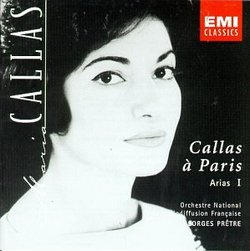| All Artists: Georges Bizet, Gustave Charpentier, Christoph Willibald Gluck, Charles Gounod, Jules Massenet, Camille Saint-Saens, Ambroise Thomas, Georges Prêtre, French Radio Orchestra, Maria Callas Title: Callas à Paris: Arias, Vol. 1 Members Wishing: 0 Total Copies: 0 Label: EMI Classics Original Release Date: 1/1/1961 Re-Release Date: 1/20/1998 Genre: Classical Styles: Opera & Classical Vocal, Historical Periods, Baroque (c.1600-1750), Classical (c.1770-1830), Modern, 20th, & 21st Century Number of Discs: 1 SwapaCD Credits: 1 UPCs: 724356646629, 724356646650 |
Search - Georges Bizet, Gustave Charpentier, Christoph Willibald Gluck :: Callas à Paris: Arias, Vol. 1
 | Georges Bizet, Gustave Charpentier, Christoph Willibald Gluck Callas à Paris: Arias, Vol. 1 Genre: Classical
|
Larger Image |
CD DetailsSimilar CDs
|
CD ReviewsA GREAT EXPERIMENT BY CALLAS Emma de Soleil | 06/27/1999 (5 out of 5 stars) "When this recording was issued in the early 1960's, there was surprise that Maria Callas should have chosen to record arias from French opera, and on top of that, six of them associated with mezzo soprano and even contralto voices. Actually, it was a wise decision, and it shows the direction her career could have taken had she chosen to follow the course she led many to believe she was taking by doing this recording. Callas had, of course, a fully developed and unusually full lower register in her voice, and she could use chest tones to great effect. Thus the arias from Gluck's "Orphee", Bizet's "Carmen", and Saint-Saens "Samson et Dalila" come off as close to flawlessly as one could get. The three arias from "Samson et Dalila" are especially fine, representing Callas at her greatest. She, of course, did record "Carmen" complete a couple of years later for EMI, but the two arias in the complete set do not have the verve and flash that they have on this recording. But there is another side to the story here. Callas's upper register, that which she utilized for her entire career, was deteriorating rapidly and mercilessly. This is obvious enough in the soprano arias she sings on this recording as well. It is not much of a problem in the "Le Cid" and "Alceste" arias, since the top B's and B flats are relatively short, and her singing of these pieces is otherwise so outstanding that a couple of bad top notes cannot spoil them. It is in the arias from "Romeo et Juliet", "Mignon", and especially "Louise" where the top notes become a real issue.Yes, there is great vocal phrasing here, and the feeling is right on target, but the climatic top notes are a real trial. The beautiful "Depuis le Jour" from "Louise" starts beautifully enough, but as soon as the music climbs above the staff, it becomes a test of the listener's endurance. Nevertheless, there is enough great work from Callas here to warrant a purchase of this recording. It also shows that Callas, given her great gifts, could have forged a new career in a new repertoire. That nothing of the sort came about is a loss for us all." French music sung to perfection Emma de Soleil | On a holiday In Ibiza, then back to the UK for stu | 05/18/2004 (5 out of 5 stars) "French was one of the languages Callas spoke fluently and beautifully. Her few recordings of French music are rare, exquisite jewels indeed. Beginning with Orphée's lament we hear not a beautiful serenade but a despaired soul yearning for its beloved, seeking what it couldn't reach, begging for a response from the one who couldn't hear its pleading. The tormented outcries "Euridice! EURIDICE!" will have you misty eyed. Singing the French version of Gluck's Alceste, a role she had sung brilliantly in Italian, having La Scala at her feet, she dazzles with a dignified elegance and brilliant style for Gluck as well as crystall clear diction and perfect phrasing. Her Carmen breathes fire and is maybe the most dangerously sexy gypsy you'll ever hear. Massenet's evil seductress Dalilah is sung with a totally different voice. Silken, husky and erotic, it is almost unbearable not to fall prey to this siren. Juliette's waltz, while magnificently phrased and coloured was recorded too late. Her Mignon is deliciously beautiful. But the highlight is her "Pleurez mes yeux". Callas finds colours and incredibly haunting pathos here. Presenting the contralto like depth of her rich low notes and magnificent middle she defines sadness, resignation, yearning for death and remembering crushed hopes. Maybe one of the most sublime examples of stylistic, tasteful singing of "verismo". Absolutely stunning, one of Callas' best recitals ever." Supreme!!!! José Manuel Vizcaya | México, D.F. Mexico | 06/02/2001 (5 out of 5 stars) "This is one of the best Callas recital!!! It's very wonderful!!! I think that the disappointed person of the first review has a problem with the ears. I don't understand french, and I don't know if Callas pronunciation is good, but the sound of the arias is very beatiful. Just listen the tracks 2, 8, 9 or 11 and prove. She sounds with strong force in all the arias... From the drammatic soprano in "Divinites du Styx" to the coloratura soprano in "Titania's" aria. If you are a Callas fan, this CD is for you. If you are not, this recording is very good for become..."
|

 Track Listings (11) - Disc #1
Track Listings (11) - Disc #1

